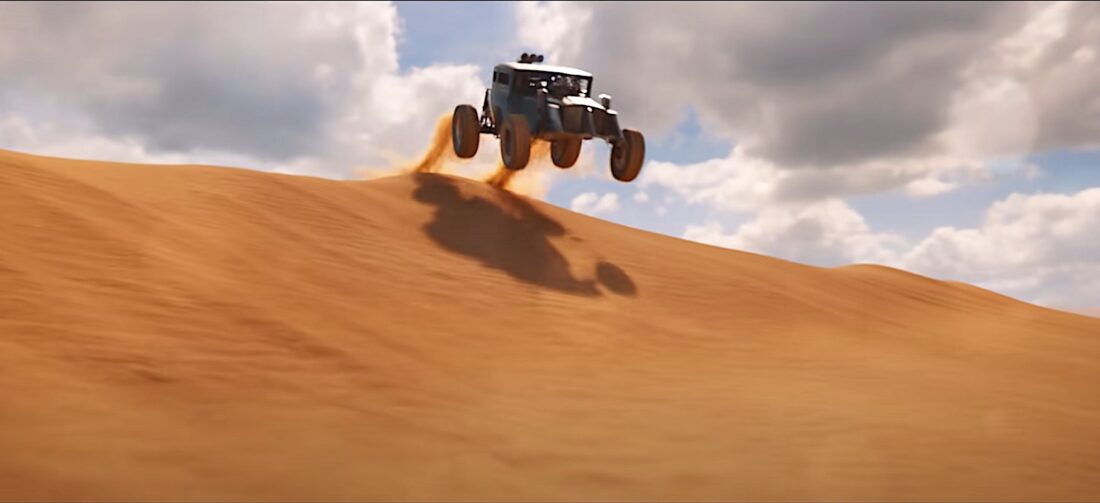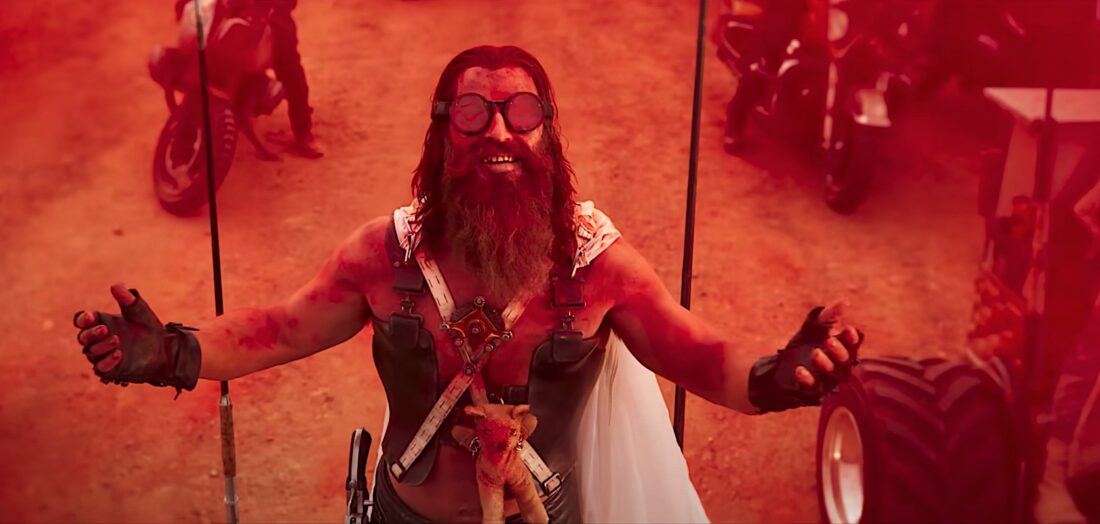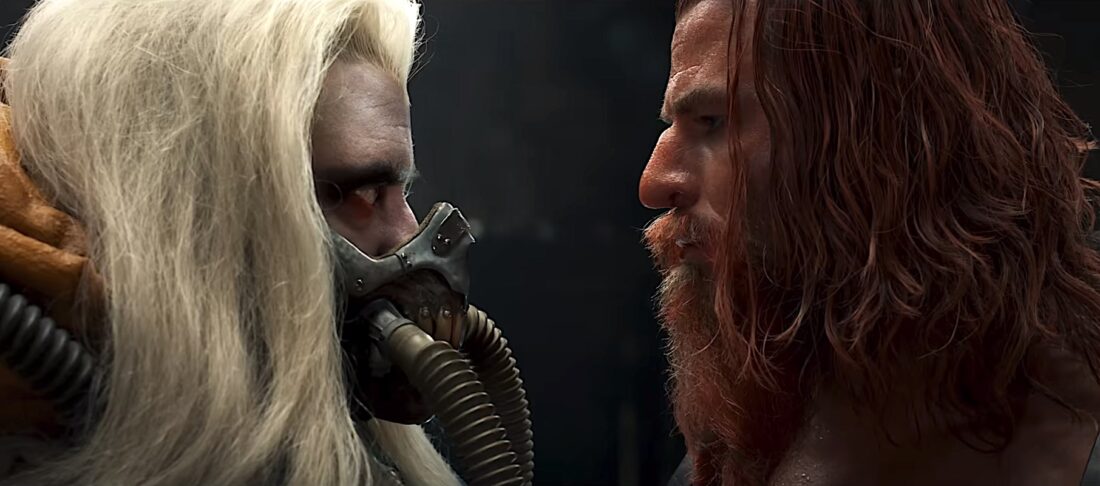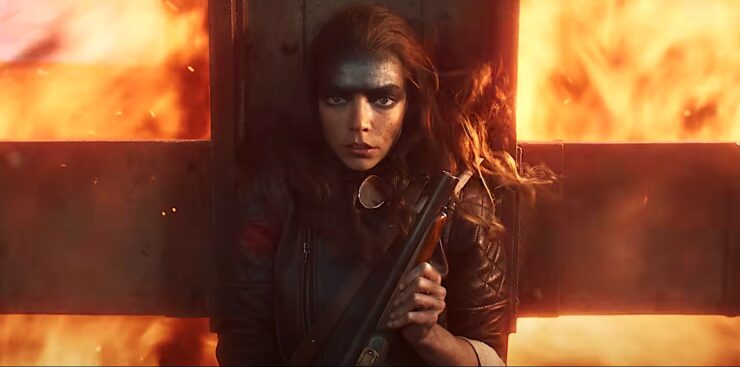“Do you have it in you to make it epic?”
When a director has a character deliver a line like “Do you have it in you to make it epic?”, it kind of feels like they’ve thrown a gauntlet down: to themself, to their actors, to the audience. A bold move! When that line is included in the trailer for the movie, that could be catastrophic, right? What if the movie doesn’t live up to the hype it’s creating for itself? What if it falls on its face?
But what if, by some moviemaking miracle, by the time the character says the line the movie has already proved itself to be more than epic, and the line adds even more layers to a character who is already a fucking phyllo dough of a person? What if that gauntlet leads to a perfect ending?
When they announced Furiosa I was not happy about it. I love Fury Road. The more years roll out behind me, and the more current films I see, the more I’m astounded that it even exists. Why were we getting yet another prequel to a story that doesn’t need one? The whole point of the Mad Max stories, at least since Road Warrior, is that they’re fables being told by people who are not Max (or, later, Furiosa) and can be totally standalone! We don’t need to know how Furiosa met Immortan Joe! We don’t need backstory about Rictus Erectus! We have imaginations! Why does every single mystery need to be explained these days???
And then, reader, I watched Furiosa.
IT’S SO GOOD.
I DON’T UNDERSTAND HOW THIS FILM IS SO GOOD.
I think George Miller might be the messiah? How is he making these beautiful weird violent movies about hope and art in the face of oblivion? How does he still have so much faith in human creativity?

Furiosa is quite different from Fury Road, in both structure and tone, but it works beautifully both as a prequel and as its own thing. It doesn’t explain anything away. It fills in some backstory, but always in service of the story its telling. And the one time I would say it gave an origin story for something (I’ll avoid saying which thing to keep this spoiler-free) it gives that object a meaningful origin story. Furiosa expands Miller’s post-apocalyptic Wasteland in so many directions we could get a dozen more films just from the ideas raised in this one, and I hope we do.
It also gives the world multiple scenes of a person monster-trucking their way out of sticky situations. I don’t know if humanity deserves such a gift, but I’m glad George Miller (and his co-writer, Nico Lathouris, and the stunt drivers) gave it to us.
I’ve loved Anya Taylor-Joy in everything I’ve seen her in, and she’s excellent as a younger Furiosa. And it’s not even that she’s laying groundwork for the character Charlize Theron played—you see her as a younger person, a bit foolhardy at times, reckless, and still hopeful for the future in a lighter way than Theron’s grim determination. She only has a few lines of dialogue throughout the film, but she holds whole worlds of emotion and character in her eyes.
And to go back a few more years, Alyla Browne is excellent as Youngest Furiosa—and again, she isn’t just imitating the older actors. She has to weather some terrible trauma and she is utterly believable. If she had seemed hammy or over-the-top for any of it the movie would have come crashing down, but every second she’s on screen feels true.
The new characters are excellent. As ever in this universe, all the small characters with incredible names like The Octoboss and Chumbucket get moments to shine, weird flair affixed to their bikes, horrifying wounds, and stylish headgear. The History Man, played by George Shevtsov, might be my new favorite character in the entire series (yes, even more than the Feral Kid) because here is a person who has known a different life, watched as society collapsed and burned around him, and broke himself again and again to stay alive. To make himself useful. Was it worth it?
We get to see a few more of the Vuvalini and they more than live up to the stories Furiosa told in Fury Road (a special shout to Charlee Fraser as Mary Jo Bassa), and we meet one of Furiosa’s mentors, Praetorian Jack (Tom Burke). The guys next to me in the theater pointed out his resemblance to Road Warrior-era Max, and Hideo Kojima himself pointed out the resemblance to Snake. He packs so much history and tragedy and, somehow, warmth into his eyes—I just, this man needs to star in a lot of stuff.

And now, I get to talk about Chris Hemsworth. Remember how Chris Hemsworth is a great actor? ‘Cause George Miller certainly did, and he gave him a gorgeous role. Dementus is a villain, but this is a Mad Max movie, so he also has a complicated backstory that we only get hints of. He contains operatic sadness. He’s grand and loves making speeches. He is, in his way, loyal. He thinks he’s a great hero, and he thinks that life is a meaningless void that can’t hold heroes anymore. At all points he thinks he’s the good guy in a story unfolding around him, and that he’s doing what he has to in order to survive. (Also he’s fucking named DEMENTUS. That’s how much George Miller loves us.) I’ve seen a lot of people talk about the Avenger-to-villain pipeline over this weekend, but it holds up: Chris Evans was perfect as Ransom in Knives Out; Mark Ruffalo was hilarious as Duncan Wedderborne in Poor Things; Robert Downey Jr. was transcendent as Lewis Strauss in my beloved Oppenheimer; now Hemsworth is a goddamn delight as Dementus.
Again, about the prequel-ness: I hate to pick on Solo specifically… but I’m going to. With all due love for Alden Ehrenreich aside, the movie explained away far too much of the character’s mystique. The arc of him being a fake bad boy who actually just wants love works well because he constructed the bad boy persona—finding out that he didn’t name himself, that someone else gave him the gun, that he has a romantic type that Leia eventually slots into perfectly, seeing the Kessel Run instead of just hearing about it—none of that makes the character larger. Filmmaking is not copyediting. Movies are not games of spot-the-reference. Leave us some goddamn room!
Furiosa doesn’t do any of that. Miller keeps with the tradition of having someone else tell Furiosa’s story. This is one possible version of what happened, maybe. Someone else could tell a different version and it would be just as possibly true. (My great hope is that George Miller appoint a legion of successors to keep telling these stories, but I genuinely don’t know who could keep this going.) There are gaps and holes and time-skips, and that’s fine. It doesn’t have to fit perfectly with the other films. There is no one defining thing that explains Furiosa away—she’s a whole person. Everything that is done to her shapes her, and what’s more important are her responses. And even when an iconic thing does get an origin story, that origin deepens the importance of the object, rather than making it feel like a prize in a scavenger hunt.
When I left Fury Road the first time back in 2015, I was vibrating. I wanted to run and scream and punch things in a good way. I settled for yelling “It’ssogoodyouhavenoidea!” at the gentleman waiting in line for the next show, who wanted to know what my friends and I thought. He looked nervous. He clearly loved these films, and he lit up as I yelled at him. I really hope he had as good a time as I did. This time was different. The film itself is slower—not more layered, but layered in a different way. Where Fury Road only covered a couple days, the action here takes place over years. James Baldwin once said that the goal of writing was to write a sentence “as clean as a bone”. Fury Road, to me, felt like a bone-clean film, and I do revere Mr. Baldwin, but there’s something to be said for the shredded muscle and sinew that George Miller and his collaborators have left on Furiosa.
Rather than making a film that tells its story through one protracted action sequence, here Miller takes the slightly more traditional path of giving us action set-pieces with quieter character-building moments between them. But never fear, all of the action scenes are fucking ASTONISHING. There’s one long sequence on the War Rig that might be even better than anything in Fury Road. There were points where I laughed out loud because I couldn’t contain my delight anymore—and that was before the monster truck showed up. And the quiet character-building moments work beautifully, because these are real people Miller and Lathouris have written, not the person-shaped cardboard cutouts with interchangeable tragic backstories so many movies are throwing at us these days.
Another thing I loved, and I don’t think this is a spoiler: this movie about Furiosa’s growth. She’s a little kid at the opening of the story, and she’s not some magical child that can wave all the threats away. Maybe it’s superhero fatigue talking, but it was a relief to watch the movie knowing that she’d have to respond to threats like a real person. It goes without saying that this is a brutal film, but there’s actual, protracted torture in this one. (Not always onscreen, but sometimes the off-screen stuff is worse.) I have a lamentably strong stomach, but there were a few points when even I wanted to look away. We also see into the home of the women Immortan Joe has enslaved, and we see why some of them might choose that life of horror over a life of horror at the base of the Citadel. But also, as in the other films, this world is not some simple binary—the women can be just as ruthless and cutthroat as the men. (There’s also the fun nuance that women appear to be equal in Dementus’ gang, as long as they’re willing to be bastards, which makes for an interesting contrast with Immortan Joe’s world, where women are used only for their womb or their milk.)

Where Fury Road is rich with layered symbolism and the interplay of water, blood, milk, and gasoline, Furiosa is a little more straightforward. The story is a circle that plays with imagery from Roman culture, Greek myth, and the Hebrew Bible, and a cape that’s kind of a dark twist on Superman. And where its predecessor/successor is essentially one long chase, this is a slower epic about how brutality and hopelessness twist people into shapes they can’t imagine. While no, you don’t gotta hand it to Immortan Joe, he at least has some organizational skills compared to Dementus. Joe is your bog standard tyrant—he wants society to function as long as he and his family can be at the top of it. Dementus is more like if you set Christopher Nolan’s version of the Joker loose on the Wasteland. He is also a dark mirror to Max Rockatansky.
Aren’t we all just one bad day away from starting a death cult in a post-apocalyptic wasteland?
The phrase “Hope is a mistake” became a standard part of my repertoire after I saw Fury Road. I’m usually saying it with at least a light dusting of irony. Furiosa takes that line, chains it to a steel table, and interrogates it for 148 minutes without even offering it a styrofoam cup of shitty coffee. This movie is about hope. It’s about how hope is enacted when there is no reason left to do so. It’s about finding a way to keep your humanity when everyone around you wants to take it away. It’s about how to shape your own self and story in a world that wants to twist you into a dead-eyed object. It’s about what hope costs, and whether it’s worth that cost. Is it worth it, to tattoo words onto every inch of your skin and become a History Man to people who only keep you around to feed their own sense of importance? Is it worth it, to fight for love? Is it worth it, to keep promises to the dead?
There’s already talk of this film being a flop, which, I’d say call no movie a flop until all the people who are going to go multiple times have gone multiple times. (It’s me, I’m all those people, I can’t fucking wait go again this weekend.) If you can possibly safely see Furiosa on a large screen, do it. If you can see it IMAX, all the better. Like its predecessor/successor, it’s not just the epic action film the trailer promises, it’s also an important film with something to say—and it says it with harpoon guns and monster trucks.










